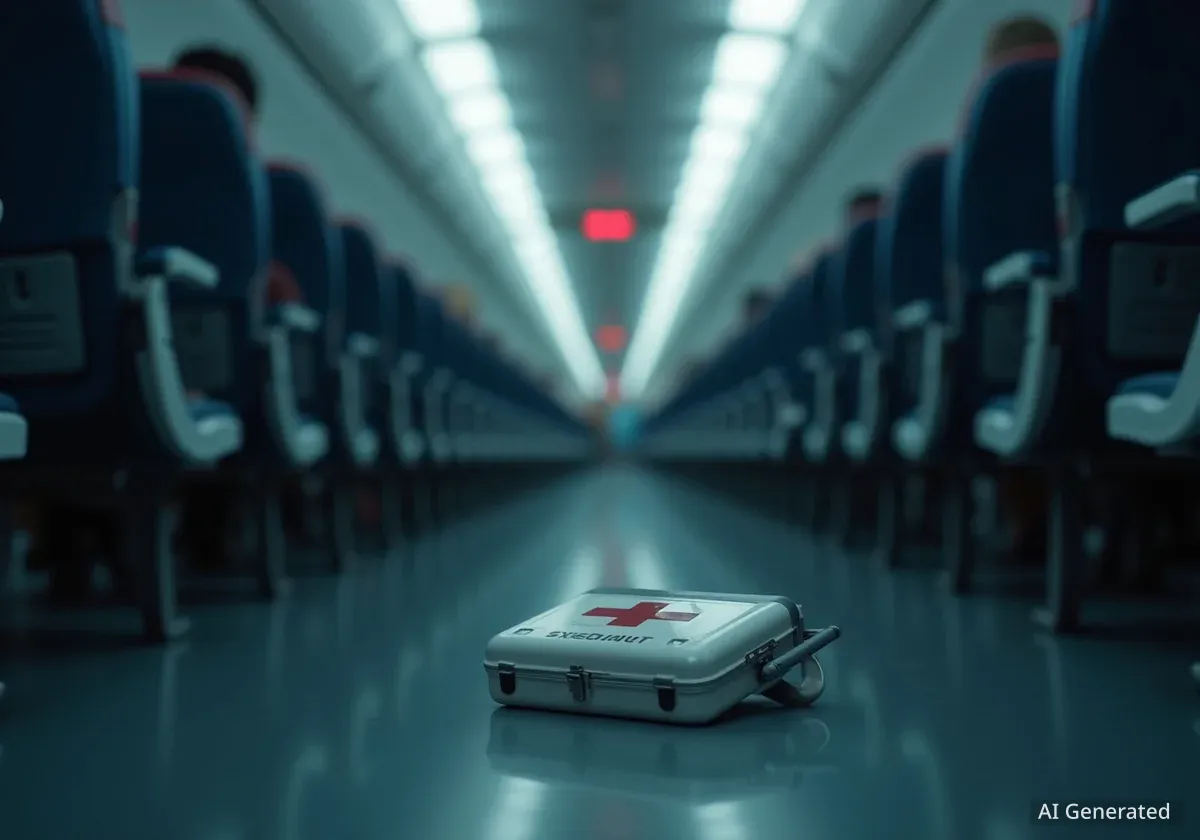A federal jury in California has ordered American Airlines to pay $9.6 million. The judgment comes after the airline was found negligent for its handling of a passenger who suffered a stroke during a flight. The jury determined that flight crew failed to follow company policies regarding medical emergencies.
Key Takeaways
- American Airlines must pay $9.6 million in damages.
- A passenger suffered a stroke on a flight from Miami to Madrid.
- Flight crew reportedly failed to follow medical emergency procedures.
- The passenger did not receive urgent medical care for eight hours.
- The airline stated it disagrees with the verdict and is reviewing options.
Jury Finds Policy Violations
The San Jose-based jury made its decision after a six-day trial. They concluded that American Airlines personnel did not adhere to established procedures. This occurred when Jesus Plasencia, a resident of Watsonville, California, experienced a stroke on Flight 68 in March 2021.
According to statements from Plasencia's legal team, the issues began even before takeoff. Evidence presented during the trial indicated Plasencia, a chef, suffered a transient ischemic attack (TIA) while the plane was still at the gate in Miami.
What is a TIA?
A transient ischemic attack, or TIA, is often called a 'mini-stroke.' It happens when blood flow to part of the brain is temporarily blocked. Symptoms are similar to a full stroke but usually last only a few minutes. TIAs are a critical warning sign that a person might have a more severe stroke soon.
Plasencia was reportedly unaware that he had experienced this initial event. However, his wife, Marcela Tavantzis, noticed his symptoms. She informed a flight attendant that her husband briefly lost motor control and began speaking "gibberish."
Failure to Report Symptoms
Despite the wife's alert, the incident was not reported to medical personnel. Instead, an American Airlines pilot cleared Plasencia for takeoff. This action contradicted the airline's own policies regarding passenger health and safety, according to his attorneys.
After the flight departed, Plasencia's stroke symptoms worsened. The flight crew reportedly asked other passengers to monitor him. However, they did not inform the pilot about the developing medical emergency.
Airline Protocols
Airlines typically have strict protocols for medical emergencies. These often include contacting ground medical support, diverting the flight to the nearest airport for urgent care, and ensuring pilots are fully informed of any serious health issues affecting passengers or crew.
This series of events meant that Plasencia did not receive urgent medical treatment for his stroke for approximately eight hours. In emergency situations of this nature, flights are usually diverted to the closest airport to ensure prompt medical attention for the affected passenger.
Legal Arguments and Verdict
Darren Nicholson, an attorney with Dallas-based Burns Charest LLP and lead counsel for Plasencia and Tavantzis, expressed strong disapproval of the airline's response.
"It is shocking that American Airlines responded so poorly to a medical emergency like this, and it is appalling that the airline tried to defend its conduct by claiming Mr. Plasencia had pre-existing conditions," Nicholson stated.
Hannah Crowe, also from Burns Charest, and Sanjiv Singh, an attorney based in San Mateo, California, also represented the plaintiffs during the trial. They highlighted the specific legal framework governing international air travel.
"Under a treaty called the Montreal Convention, passengers have extra protections on international flights," Crowe explained. "The jury rightfully determined American violated the law, and we are grateful for their verdict."
The Montreal Convention is an international treaty that sets rules for airline liability in cases of death, injury, or delay to passengers and cargo during international travel. It outlines specific responsibilities for carriers.
American Airlines Responds
In response to inquiries about the jury's decision, American Airlines issued a statement. The airline emphasized its commitment to passenger safety.
"The safety and well-being of our passengers is our highest priority," American Airlines said. "While we respect the jury’s decision, we disagree with the verdict and are currently evaluating next steps."
This statement suggests the airline may consider appealing the verdict. The outcome of this case highlights the critical importance of airline crew training and adherence to medical emergency procedures for passenger safety.
The incident on Flight 68 in March 2021 has brought significant attention to how airlines manage health crises onboard. It underscores the potential consequences when established protocols are not followed, leading to serious harm for passengers.
The $9.6 million judgment is intended to compensate Plasencia for the damages he suffered due to the delay in medical treatment. The legal team argued that earlier intervention could have prevented some of the long-term effects of the stroke.
Impact on Airline Operations
This verdict could prompt other airlines to review their medical emergency training and procedures. Ensuring flight attendants and pilots are fully equipped to handle serious health issues is paramount. Rapid response can significantly improve outcomes for passengers in distress.
The case also serves as a reminder of the legal protections afforded to passengers on international flights under treaties like the Montreal Convention. These protections hold airlines accountable for their duty of care.
Moving forward, the aviation industry will likely monitor American Airlines' next steps. Any appeal or subsequent legal action will be closely watched by passenger advocacy groups and other carriers.





